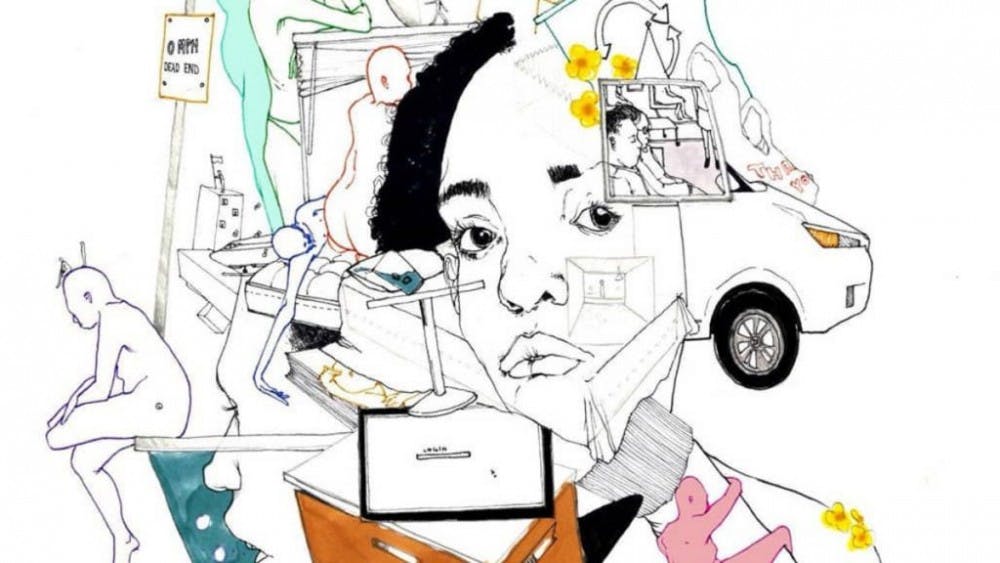When Fatima Nyeema Warner, aka Noname, released her debut mixtape Telefone in 2015, she quickly solidified herself as a unique voice in hip-hop and one of the most promising artists in the scene. Her rapping, while at times frustratingly soft-spoken and amateurish, bordered on beat poetry in a fascinating way, and her understated positivity was something that nobody in rap was or is bringing to the table. It was evident that with some extra work, the Chicago rapper, poet, and songwriter is capable of making something even greater; maybe even legendary. While she doesn’t quite reach “legendary”, Room 25 is a greater work in almost every aspect and definitely lives up to the expectations that her debut album has set.
From poet to performer
It doesn’t take long for the improvements made with Room 25 to become apparent. The opener of the record, “Self,” may just be a minute and a half long, but Noname still shows how much tighter and overall more impressive her flow has gotten. Her soft and subtle rapping style that sets her apart from others is still intact, but it’s simply more refined now. She’s improved in more areas than sheer technicality; she comes across as much more expressive and confident in her delivery, especially on tracks like the confrontational, Afrocentric “Blaxploitation” or the playful, sexual “Montego Bae”. Noname has always been a wordsmith, but it’s on Room 25 that she is coming into her own as a solid performer.
However, the change is not apparent all the time. Some of the less notable tracks, such as “Regal” and “With You” deliver in the lyrical and instrumental department but don’t deliver on striking, compelling performances that the best tracks do. For those who aren’t already in love with the subtlety of Noname’s previous work, these songs will be the hardest sells. Even for people who were already familiar with her style, such as myself, these tracks may still fail to stand out when surrounded by the other gems in the tracklist.
One thing that had no need to be improved upon is Noname’s mastery of lyricism, which is as superb as ever on this record. Her background as a slam poet truly shows in her music; she understands the power of words and knows exactly how to extract all of that power from them consistently. Whether the topic be race, class, religion, love, sex or her struggles with addiction, she’s able to not only convey her points clearly but to do it in such an incredibly beautiful, artistic manner that few writers can truly accomplish. Nowhere on the album is this more obvious than on the second verse of “Prayer Song” which has to be one of the most powerful sets of bars of the year. Very few artists have been able to tackle the topic of police brutality in such a powerful, thoughtful, and emotionally arresting way as Noname does here.
However, you would have to look toward “Don’t Forget About Me” to find the most emotionally potent song on the record. It’s crawling, downtrodden tempo and some of the most subtle production on the entire record acts as the perfect frame for what may be Noname’s greatest performance of her entire discography. Her soft and melancholy delivery works wonders as Noname goes into detail concerning her emotional struggles and her self-prescribed “brokenness” that she’s tried to deal with through drugs and alcohol. The way she sings in the chorus,”I know my body’s fragile, know it’s made from clay/ But if I have to go, I pray my soul is still eternal/ And my momma don’t forget about me/ I pray my momma don’t forget about me” sounds as if she is certain that she will be leaving this Earth sooner than later, and it’s absolutely heartbreaking.
From synthetic to organic
“Don’t Forget About Me” is also a prime example of how well the instrumentals complement the theme and mood of each song. Phoelix, who contributed to a lot of the production on Telefone, returns for Room 25, and it really does sound like he and Noname grew together stylistically. Even as Noname’s style evolved across projects, so did Phoelix’s production in a way that compliments her adjustments, as well as transitions beautifully from the mixtape format to the studio album. Telefone and Room 25 could both be described musically as jazz rap with hints of neo-soul, though the ways in which those elements come to fruition differ quite a bit. The former definitely sounded like a mixtape; while it was beautifully crafted, it didn’t sound expensive. Much of the instrumentation, as sunny, jazzy and crisp as it is, still sounds synthetically produced.
This is what separates Room 25 from Telefone. The increase in budget is easily noticeable. The majority of the instrumentation on Room 25 is or at least sounds live, and it all gives the record an amazingly lush, organic sound. The vocals drums, guitars, bass, piano, strings: it’s all performed so beautifully and arranged so immaculately! An instrumental version of this record could legitimately be enjoyed separately. That’s when you know you have a wonderfully produced hip-hop record on your hands.
A musical highlight would have to be “Blaxploitation”; its jagged bass line is not only spectacular, but it also adds to the bold themes within the lyrics. “Montego Bae” is an exotic treat blessed by some bongo drums, wonderfully executed scat background vocals, and an otherworldly vocal feature from Chicago native Ravyn Lenae. Even “Ace”, the most radio-friendly track on the album and the only song that sounds mostly synthetically produced, is a nice highlight that showcases the MC-skills of Noname and fellow Chicago rappers Saba and Smino.
Recommended if you like:
Open Mike Eagle
Solange
Erykah Badu
Top Tracks:
“Prayer Song (feat. Adam Ness)”
“Don’t Forget About Me”
“Montego Bae (feat. Ravyn Lenae)”

Featured image from DJBooth
For more entertainment related content, visit us at Bytebsu!




















